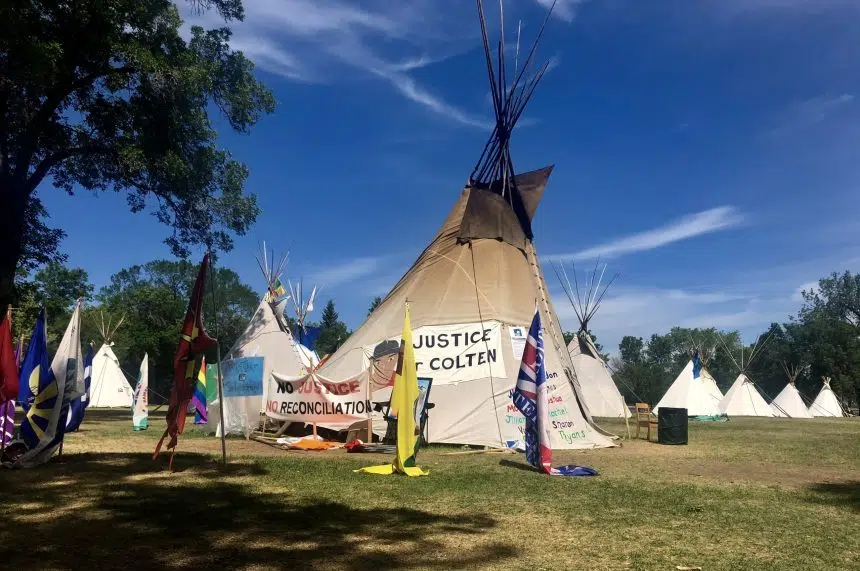The Justice for Our Stolen Children camp across from the Saskatchewan Legislature announced Monday it’s taking legal action on behalf of the protesters arrested last month.
The Government of Saskatchewan, Provincial Capital Commission and the Regina Police Service are listed as the respondents in the court document.
On June 18, Regina police dismantled the camp and arrested six protesters. They were all shortly released and never charged.
The camp was resurrected again three days later, on National Indigenous Peoples Day, with the support of various First Nations and tribal councils. Similar camps have also since popped up in parks in Saskatoon and Winnipeg.
Dan LeBlanc, the camp’s lawyer, said the court application is being made on the protesters’ constitutional right to “express themselves” by camping in Wascana Park.
“The process of staying overnight and the process of having a sacred fire is part of the way in which these individuals are expressing themselves,” he explained.
“When the government puts limits on that, it has to justify it constitutionally.”
LeBlanc added the second declaration his applicants are looking for is the acknowledgment that the arrests made at the camp were “illegal and without basis.”
“What we would hope is if the courts indicate what occurred on June 18th unjustifiably interfered with these folks’ right to express themselves, then the government will take that under advisement and will be hesitant to take steps to evict them again,” he explained.
LeBlanc noted the protesters aren’t seeking money out of the court case, just to have their “rights upheld and their voices heard.”
A Regina Police Service spokesperson told 980 CJME it “will not be commenting on any of the specifics contained in the application,” but said its lawyer will speak after the matter is heard.
The hearing is set for Aug. 23 at Court of Queen’s Bench in Regina.
Government refuses second meeting, requests camp be removed
Despite meeting with ministers earlier this month and getting an official response from the province on the list of issues they put forward, camp spokesperson Robyn Pitawanakwat said the camp’s message is being ignored.
“We have two to three new families coming (to the camp) every day, seeking support, seeking reunification with their families, and their stories are being denied — their truths are being denied,” she said.
The camp was initially set up in February to protest the acquittals of those accused in the deaths of two young Indigenous people — Saskatchewan’s Colten Boushie and Manitoba’s Tina Fontaine.
Since then, the camp has been vocally protesting racial injustice and the disproportionate number of Indigenous children in the foster care system.
Protesters have requested a second meeting with government on these issues, but the province has refused until the camp is voluntarily dismantled.
“The Government of Saskatchewan continues to work with Tribal Chiefs and the FSIN to address the issues raised by the protest camp during the meeting,” a provincial spokesperson wrote in an emailed statement Monday afternoon.
While no further comment was offered by the province, its response to the camp was provided. It outlines the progress made in the ministries of justice and social services, according to the camp’s requests.
“The Government of Saskatchewan’s expectation continues to be that the unpermitted camp will be removed from Wascana Park,” wrote the province in the last line of its July 13 letter to the camp.
“Their response has indicated our message has not been heard, that they are satisfied with the status quo and that they have no intention of making any changes and addressing the issues that we brought forward,” Pitawanakwat said.
The province issued the following letter in response to a list of actionable items released by the protest camp, noting the actions that are being taken by the government on each issue.







